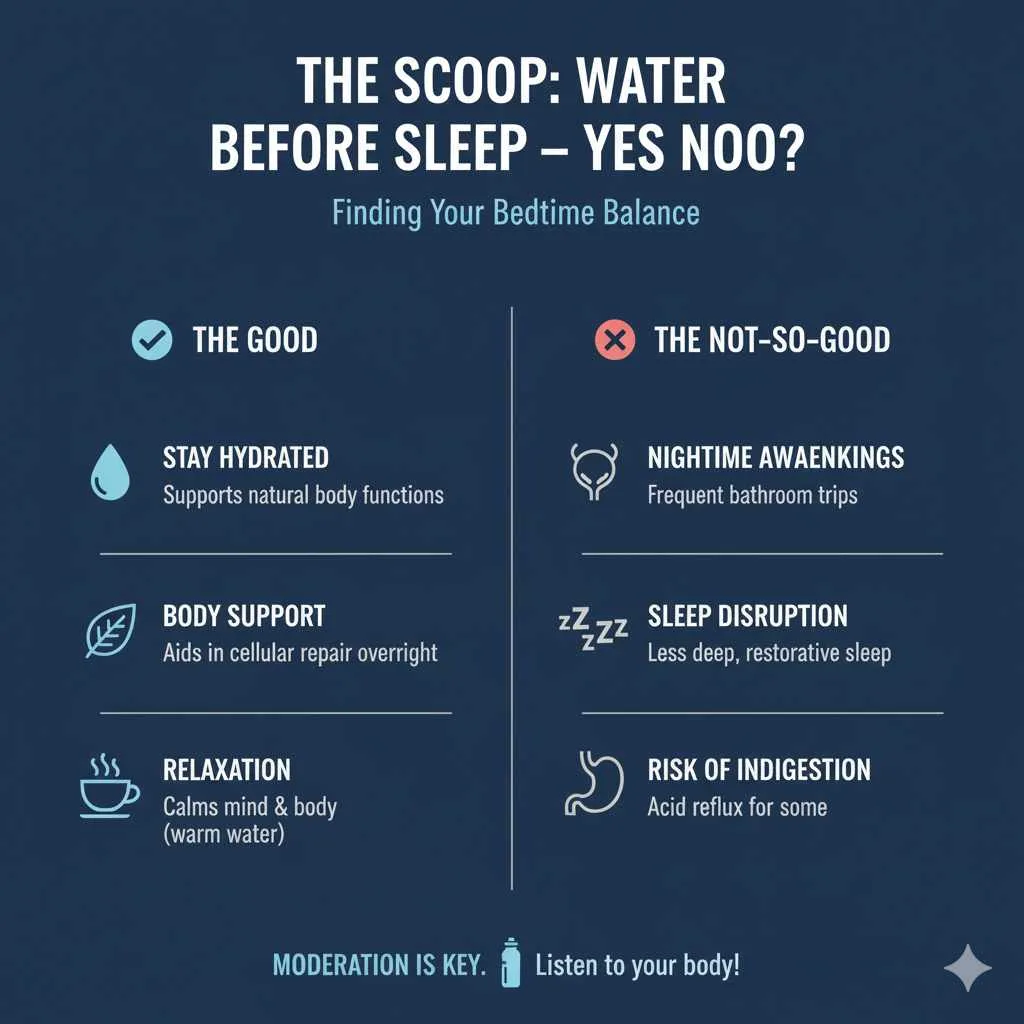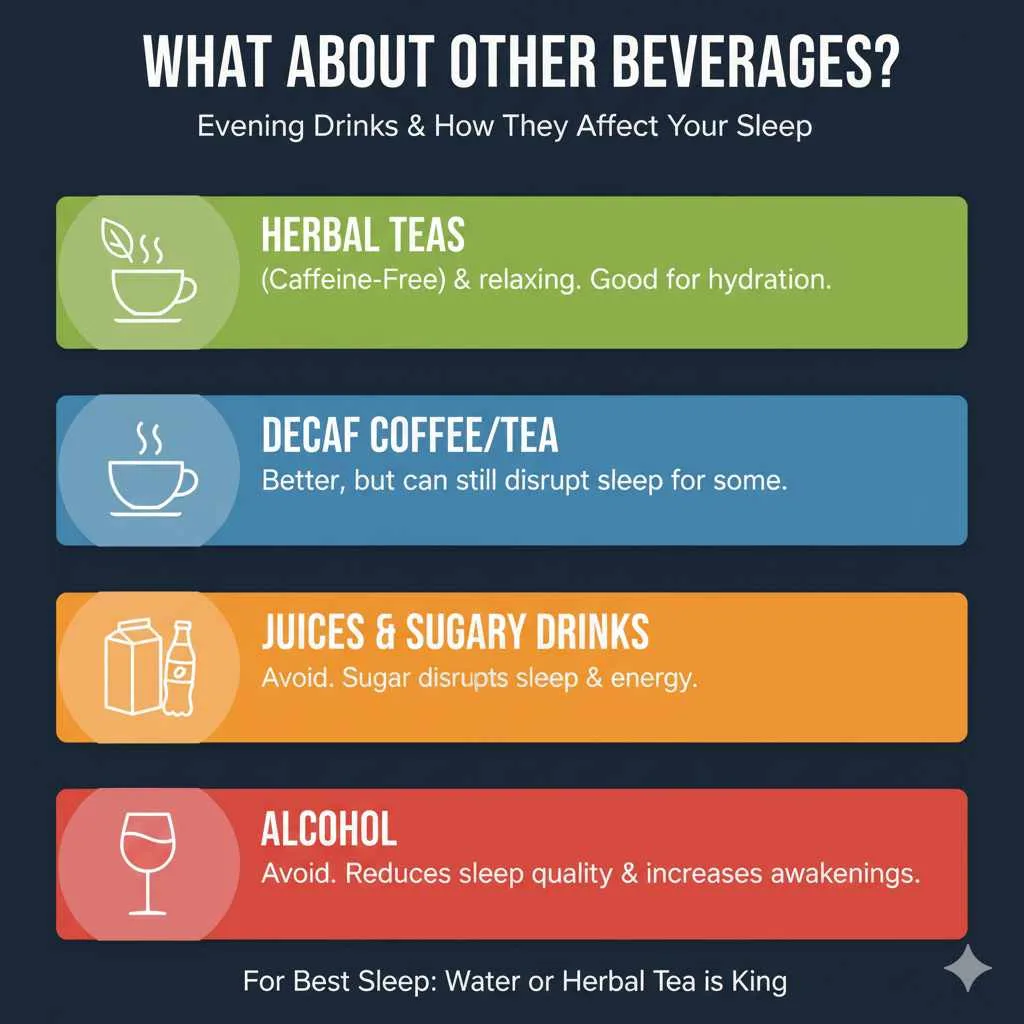Drinking a glass of water before bed can be beneficial for hydration and temperature regulation, but excessive amounts might disrupt sleep. The key is balance. Listen to your body and adjust intake to enjoy the perks without the drawbacks.
Hey there, fellow home enthusiasts! Ever find yourself wondering about the simple habits that can make a big difference in your daily well-being? One that often pops up is drinking water before you hit the hay. It seems so simple, right? But it’s one of those things many of us ponder: is it actually good for us, or could it be setting us up for a restless night? You’re not alone in this! We’re going to dive deep into this bedtime beverage and uncover the essential truth, making it super clear and easy to understand. Let’s get hydrated and well-rested together!
The Scoop: Water Before Sleep – Yes or No?
It’s a question that floats around, especially when we’re trying to cultivate healthier habits. Many of us are told to drink more water throughout the day, which is fantastic advice. But what about that final glass before drifting off? The immediate answer isn’t a simple yes or no; it’s more of a “it depends” and an exploration of the “why.”
The truth is, enjoying a moderate amount of water before bed can offer some lovely benefits. Think of it as a gentle way to support your body’s natural processes while you rest. However, gulping down a liter right before you turn off the lights might lead to a less-than-ideal situation. We’ll break down the good, the not-so-good, and how to find your perfect bedtime water balance.

Hydration: The Foundation of Well-being
Before we even get to bedtime, it’s crucial to remember why staying hydrated is so important in general. Our bodies are made up of about 60% water! This amazing fluid is involved in almost every bodily function. From regulating body temperature to transporting nutrients, cushioning joints, and helping organs function, water is truly a superhero molecule.
According to the U.S. Geological Survey, water plays a vital role in maintaining these essential processes. When we don’t drink enough, our bodies can start to feel the strain. Symptoms of dehydration can range from mild fatigue and headaches to more serious issues. So, ensuring you get adequate fluids throughout the day is the first, most important step before we even consider bedtime habits.
The Potential Perks of Pre-Sleep Sips
Now, let’s talk about that specific time: right before bed. Is there a real advantage to having a sip or two of water? The answer is a resounding potentially, yes! Here’s why:
1. Supporting Natural Detoxification and Repair
While you sleep, your body is hard at work doing its maintenance. It’s repairing tissues, consolidating memories, and yes, even detoxifying. Adequate hydration supports these vital nightly processes. Water helps the kidneys filter waste products efficiently and transport nutrients where they’re needed. Think of it as giving your body the best resources to perform its essential housekeeping while you catch those much-needed Zzzs.
2. Temperature Regulation
Staying hydrated helps regulate your core body temperature. Even during sleep, your body temperature naturally fluctuates. Proper hydration can help maintain a stable temperature, which is crucial for achieving deep, restorative sleep. If you tend to feel overly hot or cold at night, ensuring you’re well-hydrated might offer some relief by helping your body maintain its internal thermostat more effectively.
3. Mood and Energy Boosts
Waking up feeling refreshed and ready to go is the dream, isn’t it? Sometimes, dehydration can lead to morning grogginess and a less-than-ideal mood. A small amount of water before bed can help ensure you wake up feeling more revitalized. This can translate into a better mood and more energy throughout your day, setting a positive tone from the moment you open your eyes.
4. Preventing Nighttime Cramps
For some individuals, muscle cramps can strike at night. Dehydration and electrolyte imbalances are often culprits. While water alone might not fix severe electrolyte issues, maintaining good hydration levels can help prevent muscle cramps caused by a lack of fluids, allowing for uninterrupted sleep.
The Downsides: When Bedtime Water Goes Too Far
Okay, so we’ve talked about the good stuff. But what happens when you overdo it with the bedtime water? This is where the “it depends” part really kicks in. The primary concern with drinking too much water before bed is nocturia, which is the medical term for needing to urinate frequently during the night.
Here’s a closer look at the potential drawbacks:
1. Disrupted Sleep (The Big One!)
Waking up multiple times a night to go to the bathroom is a surefire way to fragment your sleep. Even if you fall back asleep quickly, each interruption reduces the amount of deep, restorative sleep you get. Poor sleep quality can lead to fatigue, irritability, reduced concentration, and even long-term health issues. For those already struggling with sleep, this can be a significant problem.
2. Increased Risk of Falls
Getting out of bed in the dark, especially if you’re groggy from interrupted sleep or feeling a bit unsteady, increases the risk of falls. This is particularly important for older adults or anyone with mobility issues. Navigating your home in the middle of the night can be hazardous if you’re not fully alert.
3. Potential for Swelling or Bloating
While less common, drinking a very large volume of water close to bedtime for some individuals might lead to a feeling of bloating or mild swelling. This is usually temporary and resolves as your body processes the fluid. It’s more of a comfort issue than a serious health concern for most healthy individuals.
Who Should Be Extra Cautious?
While most healthy adults can manage a small amount of water before bed, certain groups might want to be more mindful:
- Those with Sleep Apnea or Frequent Urination: If you already experience disruptions to your sleep or have a diagnosed condition like sleep apnea that causes nighttime awakenings, adding more trips to the bathroom could exacerbate the issue.
- Individuals with Certain Medical Conditions: People with heart failure, kidney disease, or conditions causing fluid retention might need to restrict fluid intake at certain times, including before bed. Always follow your doctor’s advice regarding fluid intake.
- Pregnant Women: While staying hydrated is crucial during pregnancy, pregnant women often experience increased urinary frequency due to pressure on the bladder. Drinking large amounts before bed can worsen this.
Finding Your Sweet Spot: How Much Water is Right?
The golden rule here is moderation and listening to your body. There’s no one-size-fits-all answer, but here are some guidelines to help you find what works best for you.
General Recommendations:
For most healthy adults, drinking a standard glass of water (about 8 ounces or 240 ml) one to two hours before bed is generally considered safe and potentially beneficial. This gives your body enough time to process the fluid and reduces the likelihood of waking up multiple times during the night.
Listen to Your Body:
Pay attention to how you feel. Do you wake up for the bathroom? Does a small sip help you feel more comfortable? Or does even that lead to interruptions? Adjust gradually. If you’re used to not drinking much before bed, start with just a few sips and see how you do.
Consider Your Day:
Your fluid needs can vary. If you’ve had a very active day, been in a hot climate, or consumed a lot of salt, you might need to ensure you’re adequately hydrated throughout the day, which might mean a slightly larger intake earlier in the evening. Conversely, if you’ve been less active and consumed plenty of fluids, you might need less before bed.
When is the Best Time to Drink Water?
While we’re focusing on bedtime, it’s worth reinforcing that the best strategy is to spread your water intake throughout the day. This ensures consistent hydration without overwhelming your system at any single time.
The Ideal Hydration Strategy:
- Morning Kick-start: Drink a glass of water soon after waking up. This rehydrates you after a night without fluids and helps wake up your system.
- Throughout the Day: Sip water consistently between meals and snacks. Aim for regular intervals to maintain optimal hydration levels.
- Before Exercise: Drink water before, during, and after physical activity to replace lost fluids.
- Evening Wind-Down: Finish your main water intake 1-2 hours before bed. If you feel thirsty closer to bedtime, a small sip is usually fine.
The National Health Service (NHS) in the UK also emphasizes that individual fluid needs can vary based on activity levels, climate, and health status. Staying hydrated is a continuous process, not just a pre-bed ritual.
What About Other Beverages?
It’s not just water we’re talking about! What about those tempting evening drinks?
- Herbal Teas: Many caffeine-free herbal teas (like chamomile, peppermint, or ginger) can be a lovely, soothing choice. They count towards your fluid intake and can even have benefits for relaxation.
- Decaf Coffee/Tea: While better than caffeinated versions, some people are sensitive to even small amounts of caffeine or other compounds that can still affect sleep.
- Juices and Sugary Drinks: These are generally not recommended before bed. The sugar can provide a burst of energy, disrupting sleep, and large volumes can still lead to awakenings.
- Alcohol: While alcohol might make you feel sleepy initially, it significantly disrupts sleep quality later in the night, leading to more awakenings and less restful sleep.
Stick to water or caffeine-free herbal teas for your pre-sleep hydration if you’re aiming for the best sleep.

Tips for Better Bedtime Hydration Habits
Ready to make informed choices about your evening water intake? Here are some practical tips to help you:
- Keep it Simple: Have a glass or bottle of water at your bedside. If you get thirsty, it’s easily accessible.
- Time it Right: Aim to finish your main hydration about 90 minutes to two hours before you plan to sleep.
- Small Sips are Key: If you feel thirsty just before closing your eyes, take just a few small sips, not a large gulp.
- Avoid Large Meals and Salty Snacks: Eating heavy or very salty foods late at night can increase your thirst and the need to drink, which in turn can lead to more bathroom trips.
- Limit Other Fluids: Be mindful of how much you drink from other sources (soups, fruits, other beverages) in the hours leading up to bedtime.
- Create a Relaxing Routine: Instead of focusing intensely on drinking water, center your pre-bed routine around relaxation, like reading, a warm bath, or gentle stretching.
Here’s a quick comparison of what to consider:
| Aspect | Benefits of Moderate Pre-Bed Water | Risks of Excessive Pre-Bed Water |
|---|---|---|
| Hydration & Bodily Functions | Supports nighttime repair, detoxification, and optimal organ function throughout sleep. | Can lead to water intoxication (rare) or uncomfortable bloating. |
| Sleep Quality | Contributes to temperature regulation, potentially improving sleep comfort. | Significantly disrupts sleep through frequent nighttime urination (nocturia). |
| Energy Levels | Helps you wake up feeling more refreshed. | Waking up tired due to poor sleep quality. |
| Comfort | Addresses thirst and can improve overall comfort before sleep. | Can cause discomfort, bloating, or a feeling of being too full. |
| Urination | Minimal impact if consumed 1-2 hours prior. | High likelihood of needing to urinate multiple times during the night. |
Frequently Asked Questions (FAQ)
Q1: Is it bad to drink water right before you brush your teeth at night?
No, it’s generally not “bad.” The main consideration is still the volume and timing. Brushing your teeth after drinking water can help ensure you don’t go to bed with a lingering taste, but the impact on sleep is determined by how much you drink, not necessarily the order of your routine.
Q2: Can drinking water before bed help with weight loss?
Drinking water, in general, can support metabolism and help you feel fuller, which may assist with weight management. While drinking water before bed won’t magically cause weight loss, being well-hydrated throughout the day and night is part of a healthy lifestyle that supports weight loss goals.
Q3: I wake up thirsty in the middle of the night. Should I drink water then?
If you genuinely wake up thirsty, a small sip of water is perfectly acceptable. However, if this is a frequent occurrence, it might be worth exploring why you’re getting dehydrated overnight. Ensure you’re drinking enough throughout the day, and consider if your bedroom is too dry. For persistent thirst, consulting a doctor is a good idea.
Q4: Can drinking water before bed cause wrinkles?
This is a myth! Dehydration can make your skin look dull and less plump, potentially making existing fine lines more noticeable. Staying adequately hydrated is actually beneficial for skin health and can contribute to a more radiant complexion. Drinking water before bed is unlikely to cause wrinkles and may even support skin recovery.
Q5: I’m an athlete. Does that change how much water I should drink before bed?
Yes, athletes generally have higher hydration needs. If you’ve had intense training sessions, replenishing lost fluids is crucial. Your doctor or a sports nutritionist may advise on specific hydration strategies, which could include a slightly larger intake in the evening, but always ensuring it doesn’t drastically disrupt sleep is key. Prioritize daytime and post-activity hydration first.
Q6: My doctor told me to limit fluids. What should I do about drinking water before bed?
If a medical professional has advised you to limit your fluid intake, it’s essential to follow their specific recommendations precisely. They will provide guidance on when and how much you should drink, which may mean abstaining from water for a certain period before sleep. Always adhere to your doctor’s instructions. You can learn more about general fluid management for certain conditions from resources like the National Kidney Foundation.
Conclusion: The Balanced Approach to Bedtime Hydration
So, is drinking water before bed good? The essential truth, my friends, lies in finding that sweet spot. It’s about being mindful of your body’s signals and your overall hydration habits. For most of us, a modest glass of water one to two hours before settling in can indeed be a beneficial part of a healthy routine. It aids in crucial bodily functions and can contribute to a more comfortable night’s rest.
However, the key takeaway is to avoid overindulging. Too much liquid too close to bedtime is a direct route to disrupted sleep, which can undermine all the positive effects of hydration. By listening to your body, timing your sips wisely, and prioritizing water throughout the day, you can harness the genuine benefits of bedtime hydration without the unwanted side effects.
Embrace this simple habit mindfully, and you’ll be well on your way to waking up feeling more refreshed and revitalized. Here’s to a well-hydrated and well-rested you!







